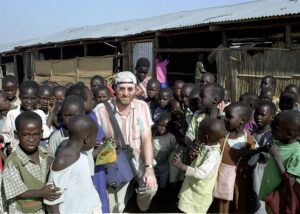Years ago, I needed some practical help. A person close to me—someone who had the ability to lend a hand—saw my need and said repeatedly, “I wish I could help, but I can’t. I feel so guilty.” That guilt did me no good. Instead of feeling supported, I felt resentful.
Today we are learning about ways in which our ancestors—and we—have deeply wounded the indigenous peoples of this land: the historic taking of land and the residential schools, and also the present inequalities in health, education and community support, along with the insidious racism of our society.
We are sorry for the part we have played in perpetuating a system of hatred and discrimination. Some of us have already lamented and confessed our guilt before God and others. We may have even asked for forgiveness from those we have wronged.
But guilt and lament are not enough.
Often a feeling of guilt simply paralyzes us—both as individuals and communities. We remain stuck, unable to bring about any meaningful change.
An alternate ending to the Zacchaeus story in Luke 19: He gets down from the tree, invites Jesus to his house, offers a nice meal, and—with tears in his eyes—expresses deep regret for the people he has defrauded. Then he gives Jesus a warm farewell, and life goes on. Zacchaeus’s victims don’t see his transformed attitude because he makes no attempt at restitution.
How do we move beyond guilt in our relationships with indigenous peoples? The love of God and neighbour calls us to do something more than simply feel shame and regret.
In this issue’s feature on page 4, Roger Epp says, “. . . the work of reconciliation is most necessary in face-to-face settings where people must decide whether to live as neighbours.” He suggests that we need to recognize that the question of the land is still at the heart of the matter.
In the web-only piece, “Making words real,” Sara Anderson and Joe Heikman offer other suggestions, such as organizing friendship-building potlucks, planning Bible studies on themes of conquest, and supporting indigenous-led projects of reconciliation.
As I write, Mennonites and their friends are taking part in the Pilgrimage for Indigenous Rights. They are walking 600 kilometres from Kitchener, Ont., to Ottawa, calling Canada’s attention to the United Nations Declaration on the Rights of Indigenous Peoples, and they’re asking that it be recognized by our government, with the approval of Bill C-262.
Organized by Mennonite Church Canada and Christian Peacemaker Teams-Indigenous Solidarity, the pilgrims are stopping along the route to connect with local communities, to teach and inspire them to take more concrete actions.
These are ordinary people, not superheroes. They have acknowledged their part in the system that has kept the original inhabitants of this land down. They have lamented and repented. But they are moving beyond the guilt, to positive action.
A camp nature instructor learned about the history of the Manitoba land on which the camp stood and realized its significance to the Dakota peoples. She and her colleagues met with a Dakota elder and heard more about his people’s reality. Then she poured her energy into helping coordinate the pilgrimage.
A mother is walking with her nine-month-old daughter, creating art along the way. She says, “I am walking for every aboriginal mother without access to solid prenatal care and post-partum support, every foster kid who doesn’t believe life will get better, and for every baby girl growing up with a depressed mother unable to get help.”
An 87-year-old self-described settler is walking and playing a drum gifted to him by indigenous friends. He is drumming and singing Christian faith songs in English and Ojibway, as an expression of his commitment to God and to indigenous peoples.
The pilgrimage has gained the attention of many through social media. At this point, we can’t know what its larger impact will be. How will changed minds and hearts take another step on the road to reconciliation? How will we, as a Christian community, move beyond guilt?
Each individual and community can respond within our own unique context. But, like Zacchaeus, who resolved to act out his repentance, we must move beyond guilt to show that we mean what we say to our indigenous neighbours.






Leave a Reply
You must be logged in to post a comment.